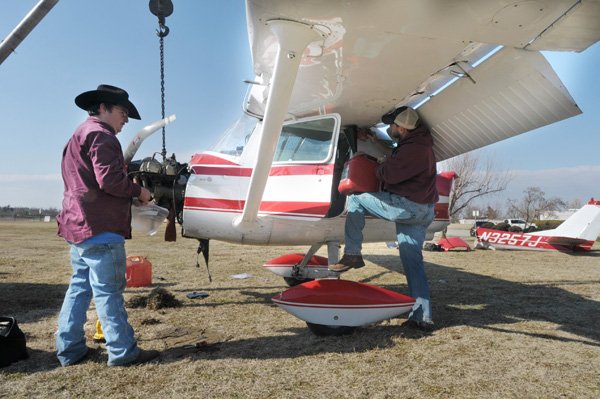FAYETTEVILLE — A lawsuit over a Springdale airplane crash was thrown out on procedural grounds Thursday.
Barry Gilbow of Fayetteville was seeking about $250,000 in damages from Jimmy Shane Crawford of Springdale for medical bills, lost earnings and loss of personal property. Crawford had a cross-claim for medical bills.
Washington County Circuit Judge Joanna Taylor tossed the case, saying Gilbow’s attorneys didn’t present evidence of what caused the crash while presenting their case Wednesday.
Legal Lingo
Directed Verdict
A ruling by a judge, typically made after the plaintiff has presented all of his evidence but before the defendant puts on his case, that awards judgment to the defendant. A directed verdict is usually made because the judge concludes the plaintiff has failed to offer the minimum amount of evidence to prove the case even if there were no opposition.
Source: Nolo’s Plain-English Law Dictionary
“This case is over due to a lack of proof on the plaintiff’s side,” Taylor explained to jurors.
Crawford voluntarily dropped his cross-claim after the judge’s ruling.
A National Transportation Safety Board investigation determined the plane ran out of gasoline. Neither side put the safety board’s report into evidence.
At issue in the case was who was responsible for the accident.
Taylor granted the directed verdict after hearing from both sides on the issue of cause. The judge found there was no evidence presented as to the cause of the accident and no testimony the plane was out of fuel.
Mark Ford, an attorney for Gilbow, argued jurors could reasonably infer the plane ran out of gasoline. He asked Taylor to allow him to reopen his case and present more evidence.
Taylor said she was sympathetic and wanted to see the case resolved in a timely manner but there was no basis in state law or legal procedure for her to allow the plaintiffs to reopen their case and address a missing, essential element of proof after the fact.
“Where in the rules am I allowed to do that? I have no authority to do that,” Taylor said.
The crash happened about 7 p.m. Feb. 12, 2011, as the men made their final approach to land the borrowed Cessna 150G. The engine died as they passed over The Jones Center north of the Springdale airport. The plane came down on the center’s lawn, hit a fence and an airport approach light and was heavily damaged.
Crawford bought the plane for a Florida man several weeks before the crash, according to testimony Wednesday.
The plane wasn’t insured, and the owner hasn’t been paid because it hasn’t been determined who was responsible for the crash, according to Donald Bacon, Crawford’s attorney.
Jurors were asked to decide whether Gilbow or Crawford was the pilot in charge of the flight.

